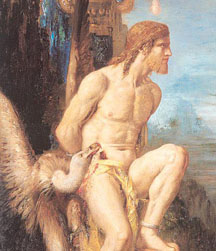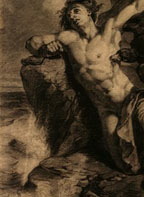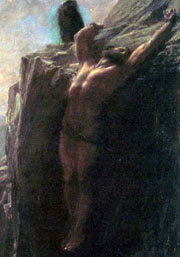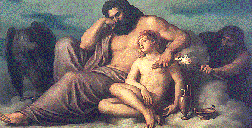|
Page 1 | Page 2 | Next: Page 4 - 20th Century | Page 5 | Home
The 19th Century
In 1818, Percy Bysshe Shelley wrote his long poem, Prometheus Unbound. And here we find the first acknowledgment and justification of the many contradictory versions of the legend. Shelley writes in his preface:
The Greek tragic writers, in selecting as their subject any portion of their national history or mythology, employed in their treatment of it a certain arbitrary discretion. They by no means conceived themselves bound to adhere to the common interpretation or to imitate in story as in title their rivals and predecessors. I have presumed to employ a similar license.
Selah. Shelley, focussing on the torment theme, squeezed Prometheus through the sieve of both Romantic emotionalism and Christianity:
The moral interest of the fableis so powerfully sustained by the sufferings and endurance of Prometheus. The only imaginary being, resembling in any degree Prometheus, is Satan; and Prometheus is, in my judgment, a more poetical character than Satan, because, in addition to courage, and majesty, and firm and patient opposition to omnipotent force, he is susceptible of being described as exempt from the taints of ambition, envy, revenge, and a desire for personal aggrandizement. (from the Preface)
 Despite this Satanic feint, Shelley (and many a Christian commentator down the years) is besotted by the obvious parallel between Prometheus' torment and Christ's suffering on the cross (right down to the wound in his side). The idea of the willful classical god is gone; Prometheus is now a monotheist, and the first words he speaks are in homage to a higher authority (and he doesn't mean Zeus). Shelley glories in his hero's goodness and Christ-like forgiveness. Compare his comment on the chastening effects of suffering (I am changed so that aught evil wish / Is dead within;) with Aeschylus' pagan hero (I hate all the Gods, / Because, having received good at my hands, / They have rewarded me with evil.) You don't find Aeschylus' Prometheus pondering what a better man he'll be for what he's been through. His bitterness is as enduring as his will. Despite this Satanic feint, Shelley (and many a Christian commentator down the years) is besotted by the obvious parallel between Prometheus' torment and Christ's suffering on the cross (right down to the wound in his side). The idea of the willful classical god is gone; Prometheus is now a monotheist, and the first words he speaks are in homage to a higher authority (and he doesn't mean Zeus). Shelley glories in his hero's goodness and Christ-like forgiveness. Compare his comment on the chastening effects of suffering (I am changed so that aught evil wish / Is dead within;) with Aeschylus' pagan hero (I hate all the Gods, / Because, having received good at my hands, / They have rewarded me with evil.) You don't find Aeschylus' Prometheus pondering what a better man he'll be for what he's been through. His bitterness is as enduring as his will.
Hot on Shelley's heels, John Keats wrote "Hyperion" in 1820 and Byron wrote a Prometheus poem (a sort of Promethean character sketch, echoing Shelley's glorification). Mary Shelley kept the creation theme alive by subtitling her 1830 Frankenstein "A Post-modern Prometheus." In the middle of the century, Victor Hugo wrote his poem "Entre Geants et Dieux" (Between Giants and Gods).
Torment. Prometheus, by Gustave Moreau (detail:
note the vulture and the Christ-like face), 1868.

About that time Prometheus shows up in the New World, this time confused wit another god pinned to a mountain top in the Caucasus. In Herman Melville's 1852 novel Pierre, the protagonist dreams of Enceladus. Henry Wadsworth Longfellow wrote the poem "Enceladus" in 1860.
Meanwhile, some big ticket names from the musical world had turned to the tale for inspiration. Beethoven's only ballet (1801) was called "Creatures of Prometheus." Franz Schubet wrote a song called "Prometheus" in 1818. Franz Liszt wrote a symphonic poem with the same title in 1860.
Torment. Prometheus Bound, by Christian Schussele
(note the waves crashing in the Caucasus), 1870.
 By the latter half of the 19th Century it is impossible to keep track of all the children of Prometheus. Books and poetry retell the legend, or use it to strengthen parallel themes. We see our boy sitting on mountain tops, staked out on seaside rocks against which waves crash, pecked at by eagles and vultures, writhing in pain or enduring with Christ-like calm. He is still idealized, but not particularly godlike. By the latter half of the 19th Century it is impossible to keep track of all the children of Prometheus. Books and poetry retell the legend, or use it to strengthen parallel themes. We see our boy sitting on mountain tops, staked out on seaside rocks against which waves crash, pecked at by eagles and vultures, writhing in pain or enduring with Christ-like calm. He is still idealized, but not particularly godlike.
Torment. Prometheus, by Briton Riviere, 1889.

Fire-theft. Raub des Feuers, Christian Griepenkeri (Zeus dallies with Ganymede while Prometheus steals the fire and a prescient vulture watches), c. 1890
Next: Page 4 -20th Century
Page 1 | Page 2 | Page 5 | Home
Top
|
 Despite this Satanic feint, Shelley (and many a Christian commentator down the years) is besotted by the obvious parallel between Prometheus' torment and Christ's suffering on the cross (right down to the wound in his side). The idea of the willful classical god is gone; Prometheus is now a monotheist, and the first words he speaks are in homage to a higher authority (and he doesn't mean Zeus). Shelley glories in his hero's goodness and Christ-like forgiveness. Compare his comment on the chastening effects of suffering (I am changed so that aught evil wish / Is dead within;) with Aeschylus' pagan hero (I hate all the Gods, / Because, having received good at my hands, / They have rewarded me with evil.) You don't find Aeschylus' Prometheus pondering what a better man he'll be for what he's been through. His bitterness is as enduring as his will.
Despite this Satanic feint, Shelley (and many a Christian commentator down the years) is besotted by the obvious parallel between Prometheus' torment and Christ's suffering on the cross (right down to the wound in his side). The idea of the willful classical god is gone; Prometheus is now a monotheist, and the first words he speaks are in homage to a higher authority (and he doesn't mean Zeus). Shelley glories in his hero's goodness and Christ-like forgiveness. Compare his comment on the chastening effects of suffering (I am changed so that aught evil wish / Is dead within;) with Aeschylus' pagan hero (I hate all the Gods, / Because, having received good at my hands, / They have rewarded me with evil.) You don't find Aeschylus' Prometheus pondering what a better man he'll be for what he's been through. His bitterness is as enduring as his will.
 By the latter half of the 19th Century it is impossible to keep track of all the children of Prometheus. Books and poetry retell the legend, or use it to strengthen parallel themes. We see our boy sitting on mountain tops, staked out on seaside rocks against which waves crash, pecked at by eagles and vultures, writhing in pain or enduring with Christ-like calm. He is still idealized, but not particularly godlike.
By the latter half of the 19th Century it is impossible to keep track of all the children of Prometheus. Books and poetry retell the legend, or use it to strengthen parallel themes. We see our boy sitting on mountain tops, staked out on seaside rocks against which waves crash, pecked at by eagles and vultures, writhing in pain or enduring with Christ-like calm. He is still idealized, but not particularly godlike.